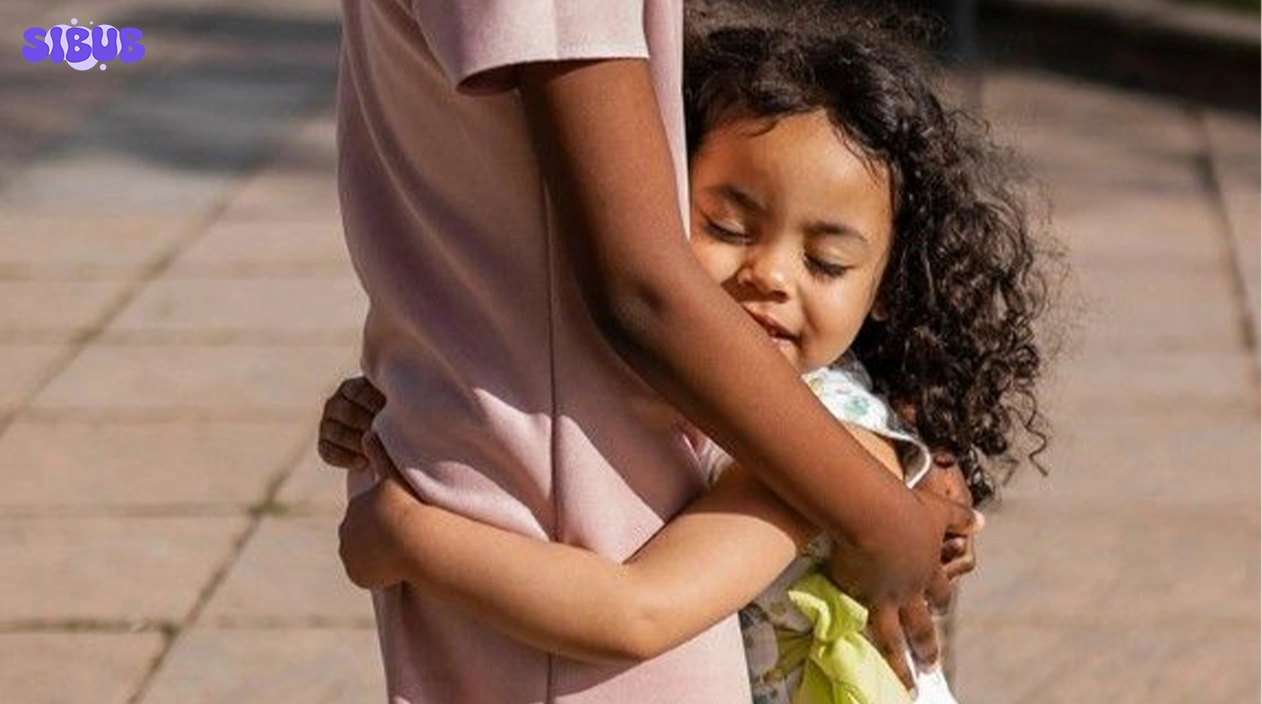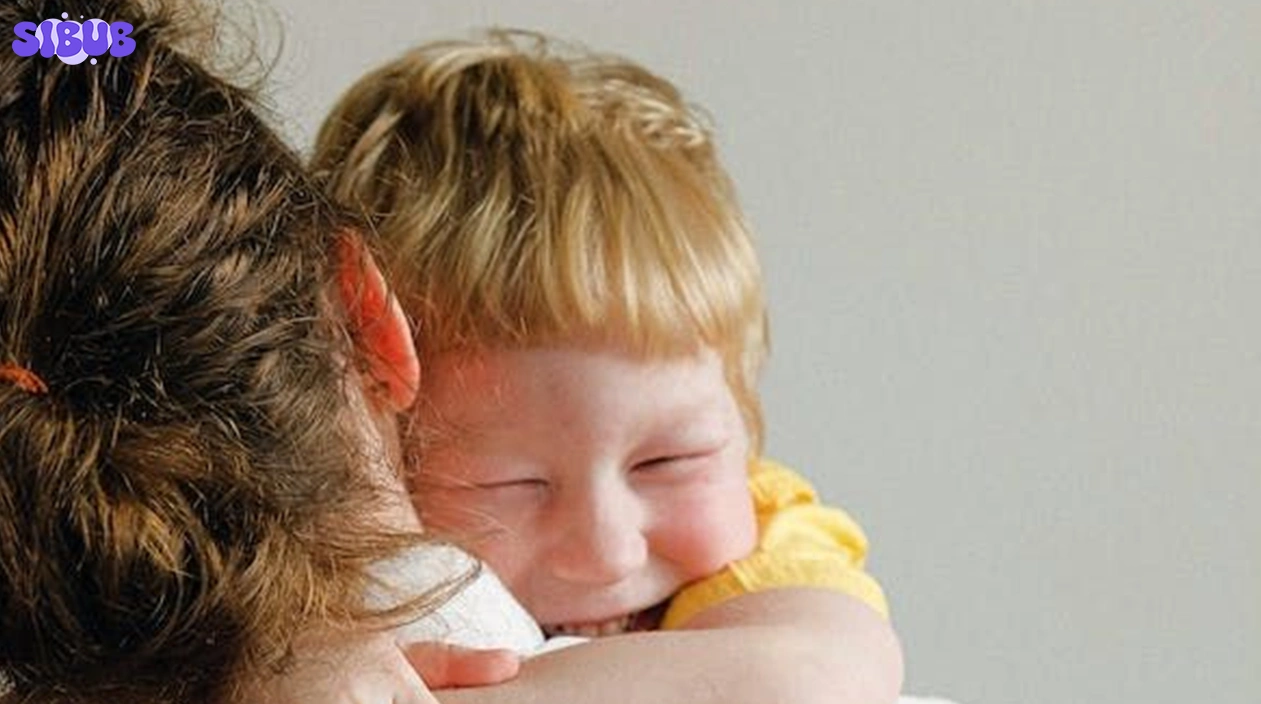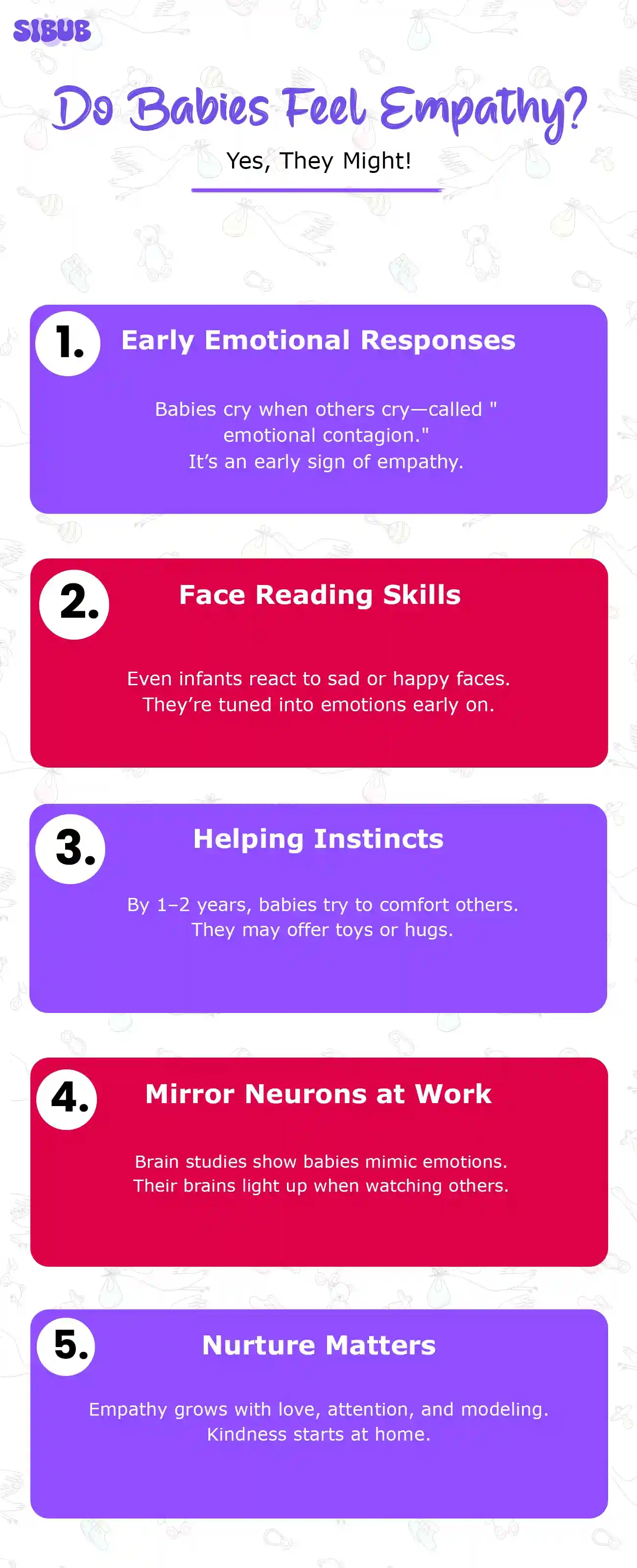More than cute coos and cuddles, even before first words, babies feel your emotions!
It might be hard to imagine, but the ability of infants to sense and respond to others’ emotions begins much earlier than most people think. This is called baby empathy. No doubt, babies do not understand the world, but they will understand your emotions. They lay the foundation for emotional connection, even before talking or walking.
Recent studies suggest that babies are not only capable of feeling empathy but are also biologically connected to it.
What Is Baby Empathy?
Baby empathy refers to an infant’s capacity to recognize and respond to the emotions of others. This is an early form of empathy that is often observed as mood catching or catching the feelings. For example, your baby will cry when s/he hears another baby cry, right? It’s an important step in the baby’s emotional development.

When Do Babies Develop Empathy?
The development of empathy in babies is a slow and gradual process:
- Newborns: Even within the first few days of life, infants show signs of catching the feelings.
- Around 6 months: Babies begin to show social smiles and respond to caregivers’ emotions. This shows early emotional response in babies.
- By 12 months: By this time, infants start to engage in social referencing. They are looking to caregivers for cues on how to react in unfamiliar situations.
- Between 18 to 24 months: Toddlers may show concern for others. For example, offering a toy to a crying peer. This marks clear signs of empathy in toddlers.
Discover: Acetaminophen for Fever and Pain in Children: Safe Dosing and Tips for Parents
Early Emotional Intelligence in Infants
Early emotional intelligence in infants is tied to their ability to understand the emotions of people around them. They actually mirror these emotions. This mirroring is facilitated by mirror neurons in infants. These arespecialized brain cells that activate in two situations. First, when an individual performs an action, and then, when they observe the same action performed by another. These neurons play a significant role in imitation as well as empathy.
Infant Empathy Signs: What to Look For
Parents and caregivers can observe various infant empathy signs, including:
- Mimicking facial expressions: Babies often imitate the smiles or frowns of those around them.
- Crying in response to others: Hearing another baby cry may prompt a similar reaction.
- Offering comfort: Toddlers might try to soothe someone in distress by offering a toy or a hug.
- Concerned expressions: Babies may look worried or attentive when someone nearby is upset.
These behaviors indicate that even at a young age, children are attuned to the emotions of others. This is a key aspect of empathy in early childhood psychology.
Baby Social Development Stages and Empathy
Empathy development aligns with key baby social development stages:
- Attachment Formation: Secure attachments with caregivers provide a safe base for exploring emotions.
- Social Referencing: Babies look to caregivers to gauge how to react in new situations.
- Imitative Play: Through play, infants practice and understand social interactions.
These stages are crucial for fostering empathy and social understanding.Heloa, aux côtés des parents.

Explore: When Does an Infant Get Teeth? 7 Things Parents Should Know
The Role of Caregivers in Fostering Empathy
Caregivers play a pivotal role in nurturing baby empathy:
- Responsive Interaction: This means to actively respond to a baby’s needs. This teaches them that their emotions are valid and understood.
- Modeling Behavior: Demonstrating empathetic behavior sets an example for children to copy.
- Emotion Labeling: Helping babies identify and name emotions improves their emotional understanding.
Consistent, loving interactions lay the groundwork for empathetic development..
Understanding Baby Emotions Through Play
Playtime offers valuable opportunities for understanding baby emotions:
- Mirror Play: Babies learn about themselves and others by observing reflections. This helps them in self-recognition and empathy.
- Role-Playing: Use dolls or stuffed animals to act out scenarios. This helps toddlers understand different emotional perspectives.
- Storytelling: Reading stories that explore various emotions can prompt discussions and understanding.
Engaging in these activities supports emotional growth and empathy.
The Science Behind Empathy in Early Childhood Psychology
Research in early childhood psychology underscores the biological and environmental factors influencing empathy:
- Neuroscientific Findings: Studies show that some parts of the brain, associated with empathy, are active even in infancy.
- Environmental Impact: Children raised in nurturing environments tend to develop stronger empathetic abilities.
- Cultural Influences: Cultural norms and practices can also help infants understand empathy. These norms help them shape how empathy is expressed and understood.
These studies highlight a connection between a baby’s capacities and external influences in empathy development.
Learn More: Molluscum Contagiosum Treatment for Children
Tiny Hearts, Big Feelings
Babies might not yet speak in full sentences or understand the world the way we do, but their hearts are already hard at work. As surprising as it may sound, baby empathy is not just a feel-good theory. Research shows that the emotional world of infants is richer and more responsive than we once thought.
From the very first months of life, babies show signs of tuning into the emotions of those around them. It can be crying in response to another baby’s distress, or their eyes lighting up when you smile. These early behaviors are powerful signals of early emotional intelligence in infants.
As we’ve seen, infant empathy signs are small and subtle at first, like a widened gaze or a soft frown when someone nearby is upset. But as they grow, so does their ability to understand, mirror, and even act on those emotional cues. Thanks to the mirror neurons in infants, their brains are wired to connect, respond, and relate long before they learn the word “empathy.”

So what does this mean for you as a parent?
It means every cuddle, every shared giggle, every moment you spend acknowledging your baby’s feelings is helping them. These gestures are building emotional response in babies and shaping their empathy muscle. You’re not just raising a child, you’re raising a human being capable of kindness, connection, and compassion.
Understanding baby emotions isn’t just about managing tantrums or sleep schedules. It’s about nurturing that deep, instinctive ability your child already has to care about others. You must recognize the baby’s social development stages. This way, you’re better equipped to support the growth of emotional intelligence that will serve them for a lifetime.
In the whirlwind of diapers, feedings, and milestones, it’s easy to overlook just how emotionally aware your baby already is. But the next time your little one reaches out to comfort you with a touch, or pauses when you’re sad, remember: those aren’t just cute moments. They’re the seeds of empathy taking root.
Because even the tiniest hearts can hold the biggest feelings.
Ultimately…
Empathy is not a trait that suddenly appears in adulthood; it begins to take root in infancy. Through attentive caregiving, engaging play, and supportive environments, we can nurture baby empathy. This can set the stage for emotionally intelligent and compassionate individuals.
